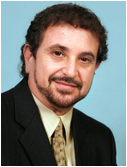NSU Newsroom
SharkBytes
Horizons
This version of NSU News has been archived as of February 28, 2019. To search through archived articles, visit nova.edu/search. To access the new version of NSU News, visit news.nova.edu.
This version of SharkBytes has been archived as of February 28, 2019. To search through archived articles, visit nova.edu/search. To access the new version of SharkBytes, visit sharkbytes.nova.edu.
CPS Professor Provides Training to Mental Health Professionals in Northwestern Spain
Center for Psychological Studies (CPS) Professor Steve Gold, Ph.D., presented a two-day workshop at the Universidad de Salamanca, on understanding and treating dissociation. The workshop, facilitated by CPS Fulbright Scholar Veronica Francia Juanes Vaquero and hosted by Professor José Navarro Gongora of the Universidad de Salamanca, was very well received by attendees from throughout Europe and Latin America.
The conference entitled, “Understanding and Treating Dissociation: Expanding Awareness, Memory and Identity” was designed to provide training to mental health professionals and graduate students in dissociation, a type of psychological difficulty that research shows is extremely prevalent, but receives little or no coverage in most graduate training programs. Dissociation is the third most common type of psychological problem after anxiety and depression.
The workshop surveyed the different forms dissociation can take and how to recognize them, discussed the causes of dissociative difficulties, and explained how to treat them.
According to Gold, many mental health professionals have been told that dissociation is so exceedingly rare that it is hardly ever encountered in general practice, and they are therefore taught little or nothing about it. Research findings over the last three decades suggest otherwise; dissociation is much more common than previously believed and frequently co-occurs with other conditions. Even therapists who are familiar with dissociation may equate it almost exclusively with dissociative identity disorder (DID), previously known as multiple personality disorder. There are dissociative experiences, symptoms and syndromes beyond DID that are much more prevalent and which often go unnoticed. Gold says that dissociation is the third most commonly experienced syndrome after anxiety and depression.
